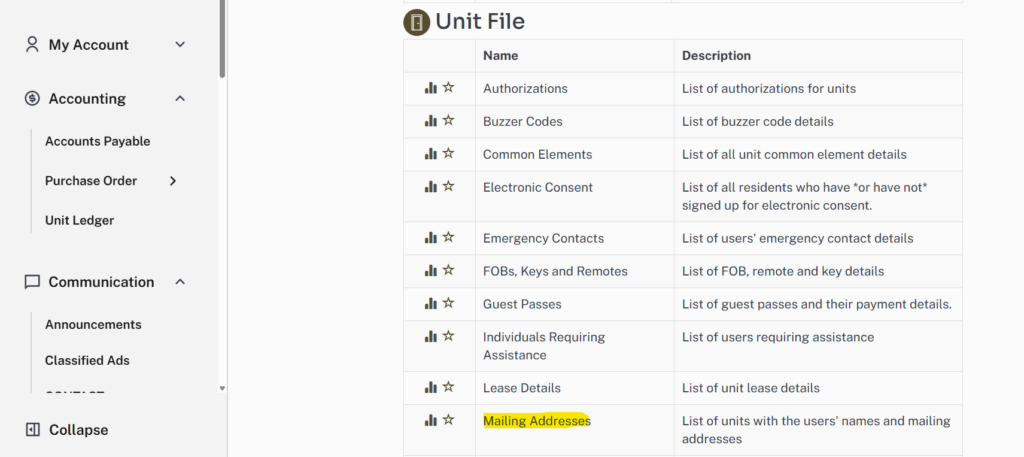Sometimes, small details matter. In fact, a condominium corporation was asked to appear before the Condo Authority Tribunal (CAT) because of poor record-keeping.
In this article, we will explore record requirements in Ontario, and share some tips on how your condo can steer clear of legal complications associated with improper record keeping.
Table of contents
- Record requirements in Ontario
- Who can ask to see records?
- Consequences of poor record keeping: a real-world example
- How Condo Control can help your condo meet record-keeping requirements
Record requirements in Ontario
Condominium corporations are obligated, under the Condominium Act, to create, maintain and to provide records to owners, purchasers and mortgagees on request.
These records include:
- Governing documents
- Meeting minutes
- Financial records
- Lists and addresses of owners and mortgagees
- Reserve fund studies and plans
- Contracts
- Budgets
Who can ask to see records?
All current unit owners, mortgagees and purchasers can request access to or copies of records from their condo corporation by submitting a mandatory Request for Records form.
Condo corporations must respond to a request within 30 days using the mandatory Board’s Response to a Request for Records form. The response must state whether they will provide the records, and whether there is a fee for the records.
If there is a dispute about records, or an owner does not receive a response from the corporation, a requester may file a dispute with the Condominium Authority Tribunal.
The CAT is an online tribunal dedicated to helping condo owners and corporations resolve disputes more quickly and affordably. It aims to keep small condo disputes out of courtrooms.
The Tribunal will hear disputes related to condo records, noise, odours, light, vibration, smoke, vapour, pets, animals, vehicles, parking, storage, other types of nuisances, and compliance with CAT settlement agreements.
It’s worth noting that the CAT is designed with self-represented parties in mind. This design makes it more accessible to individual owners who need help but can’t afford to hire a lawyer.
Consequences of poor record keeping: a real-world example
As mentioned earlier, Ontario condos are legally required to keep certain documents, including a complete list of owners and mortgagees (required by subsection (3). 2015, c. 28, Sched. 1, s. 41).
More specifically, a corporation must maintain a record of:
(a) the owner’s name and the identification of the unit, if an owner, at any time, gives notice to the corporation in writing, setting out the owner’s name and, in accordance with the regulations, identifying the owner’s unit;
(b) the owner’s address for service if,
(i) an owner who has given the notice described in clause (a), notifies the corporation in writing, at any time, of the owner’s name and address for service, including any change in the address for service, and
(ii) the owner’s address for service is in Ontario;
(c) the mortgagee’s name, the identification of the unit and the mortgagee’s address for service, if,
(i) a mortgagee, at any time, gives notice to the corporation in writing, setting out the mortgagee’s name and, in accordance with the regulations, identifying the unit that is the subject of the mortgage,
(ii) under the terms of the mortgage, the mortgagee has the right to vote at a meeting of owners in the place of the unit owner or to consent in writing in the place of the unit owner,
(iii) the mortgagee notifies the corporation in writing of the right described in subclause (ii) and the mortgagee’s address for service, including any change in the address for service, and
(iv) the mortgagee’s address for service is in Ontario; and
(d) any prescribed information.
Furthermore, there are situations where a corporation would be required to send a notice to mortgagees as well as owners.
In most cases, the mortgagee will be a bank. The mortgagee holds a financial interest in the property, which is why it needs to be included in some condo business.

So, what does all of this have to do with record-keeping? An owner of 2 units, Elizabeth Bernard, requested a copy of the list of owners and mortgagees from her condo corporation in February of 2025. She is legally entitled to see that list.
The corporation complied; however, it sent her 3 different versions of the list, each flawed in some way.
- List 1 lacked full addresses and mortgagee details
- List 2 had a different format but was still missing key address components
- List 3 included full addresses, but was so poorly formatted that column misalignment made it difficult to interpret. This list did not make any reference to mortgagees
Elizabeth decided to bring this matter before the CAT. She argued the record provided to her by the corporation was not adequate. She also requested an order for a penalty of $2,000, plus Tribunal costs of $200 to file the application.
While the CAT did not find a refusal to provide the record, it did find that the corporation’s approach was confusing and non-compliant with formatting expectations.
The CAT ordered the corporation to produce a properly aligned and complete version of the list. If no mortgagee information exists, the corporation must state that in writing.
Finally, the corporation was ordered to cover the $200 filing fee, but was not asked to pay $2,000.
This case highlights the importance of not just providing records but doing so in a way that meets both legal requirements and practical usability. Details matter!
How Condo Control can help your condo meet record-keeping requirements
How can condos avoid situations like the one described above? Using a condo management platform can drastically improve the quality and accuracy of condo records.
One source of truth
For starters, Condo Control helps to ensure that there is one source of truth for records. Instead of finding out that staff each have their own lists of owner details, Condo Control has a dedicated record library which can be customized based on the condo’s needs.
Create private folders for the board, or open files for the entire community. It’s also very easy to search for one particular item with our enhanced in-content search feature.
From financial records to contracts to minutes, keep all of your important documents in a secure, centralized area.
Finally, if you integrate another software like QuickBooks, you only need to update data in one of the platforms. Automatic syncs save you time and reduce data entry mistakes.
Custom groups for accurate lists and easy communication
You don’t even need to make your own list of owners and mortgagees when you use Condo Control. Use the groups feature and unit file to effortlessly build and maintain up-to-date lists.
When setting up your workspace, you will have the option to create groups. Most communities list staff, owners, residents, board members, etc. However, you can also create special groups for:
- In trust
- Mortgagees
- Caretakers
- Real estate agents
- Power of attorneys
You can limit activity so that they only receive announcements, but you can also give groups additional access to things like surveys or proxy voting, if appropriate.
Groups come in handy when you need to send communications to select individuals. It’s easy to fulfill notice requirements when your list of recipients is already made. You can also be proactive and share information that is not legally required, but would be useful to a specific group.
As for generating and providing lists of records, it only takes seconds to add owner, resident and mortgagee details to a unit.

Once that is done, Condo Control’s reports feature will offer you a complete, well-formatted record of “Mailing Addresses.”
This list can be downloaded in multiple formats, making it easy to share.
Automatic audit trails
Whether it’s a service request, an amenity booking or an online payment, you’ll see a record of the activity in Condo Control. Audit trails are created automatically, eliminating the need to document payments manually or maintain binders full of service requests.
Not only does this functionality create more transparency for residents, but automating manual work frees up valuable time for staff.
Conclusion
Small details are important, but they can also eat up a lot of a manager’s time. By using condo management software to assist with record-keeping and other routine tasks, communities can stay compliant and efficient.























